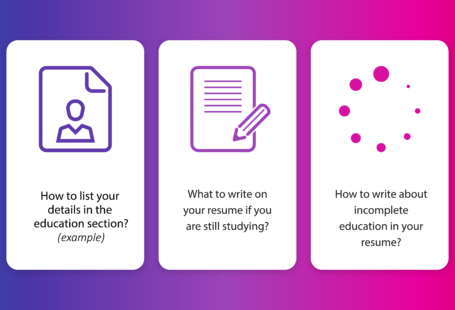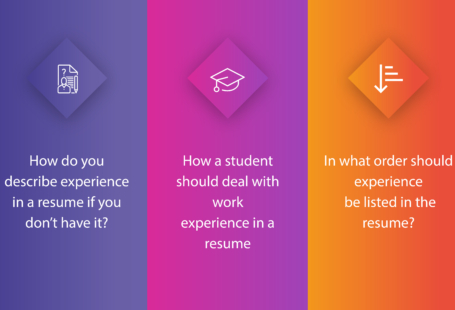One of the most important sections of a resume is the «skills» section. When people are applying for jobs and wondering what skills to put on a resume, it can be a difficult consideration as there are so many professional skills that the hiring manager is looking for.
This is why we’re breaking it down in this comprehensive guide for you to understand how to go about listing skills and abilities for resume creation so that you can improve your chance of landing your dream job.
In this article you will learn:
- What are the key skills to put on a resume? Details and a list of good skills to put on resumes.
- How to describe hard skills in a resume? The difference between hard skills and soft skills in resumes.
- What skills set are employers looking for? Job-related skills CV examples and samples for you.
- What are the key skills for different jobs? How to list skills on a resume tailored to job types.
The difference between qualities and skills
The most common mistake that applicants make on their resume is that they confuse professional skills and personal qualities on their CV, which is not clear for the hiring manager to read and grasp what your actual technical skills are, and what your personal abilities are. There is a difference between the two.
This brings up questions like: «Is communication a professional skill or a personal quality?» Understanding the difference is crucial if you want your resume skills to stand out from the competition. And it’s not clear-cut and easy to know, hence dedicating an entire article to becoming crystal clear on how to craft the skills section of resumes.
We’ll go into more detail below, though for now – spoiler! The answer to the question above is that communication is a professional skill, if you take, for example, copywriting or verbal professional communication in meetings. Sociability, however, is a personal quality.
Skills VS Qualities
A skill defined as the ability to do something that requires training, experience or practice. Put simply, skills can be acquired and they can be forgotten.
Professional skills examples: HTML, copywriting, negotiating, public speaking.
A quality is what you were born with. It describes traits that distinguish you from other people.
Personal qualities examples: hardworking, sociable, motivated, optimistic.
See also: Article about personal qualities in our blog
Undoubtedly, personal qualities are fundamental in how successful you will be in a given profession. For example, a programmer does not have to be sociable, but it is extremely important to be diligent and attentive.
The presence of certain personal qualities also allows you to get professional skills efficiently and quickly. For example, if you’re a focused, hard-working person, you’ll be more inclined to pick up the skill of coding than someone who is not so focused and has difficulty learning complex skills.
Types of skills to write on a resume
Skills on resumes are divided into 2 groups: Soft skills and Hard skills (including professional skills and technical skills). This article will detail soft skills and both kinds of hard skills, offering examples for you to use on your own resume.
Soft skills
The term «Soft skills» is defined by Oxford dictionary as:
«Personal qualities that allow you to interact with people effectively and harmoniously».
Soft skills are a combination of social skills, communication skills, relationship skills, career qualities, and social and emotional intelligence. They are the result of the development and application of your innate personal qualities through life.
Soft skills are acquired throughout life, generally through personal experience or some training.
These skills characterize a person and are independent of work. These skills cannot be measured or defined in a particular role or industry. They are formed on the basis of the personal qualities of a person and they are applied to professional roles naturally as a result of how a person shows up in the world.
The examples below reveal how soft skills can translate on a resume to skills needed for professional contexts.
Transferring to resume skills
- Sociability of an extrovert develops into a professional communication skill.
- Responsibility develops into leadership capability.
- Consolidation and rationality transfer into time management skills.
- Flexibility is a skill that enhances creative problem-solving.
- Perfectionism is a skill that heightens attention to detail.
According to CareerBuilder research, 93% of employees believe that personal qualities are necessary for successful work performance.
Tip: Indicate in the resume only relevant skills, which meet the requirements of the position that you are applying for. 65% of recruiters only consider relevant skills in the resume, and the rest of the skills listed are essentially «wasted words».
It can be said that some of the best companies in the world are built by technicians with soft skills; they successfully negotiate, have the makings of a leader, have strong integrity and responsibility, and are able to solve problems effectively.
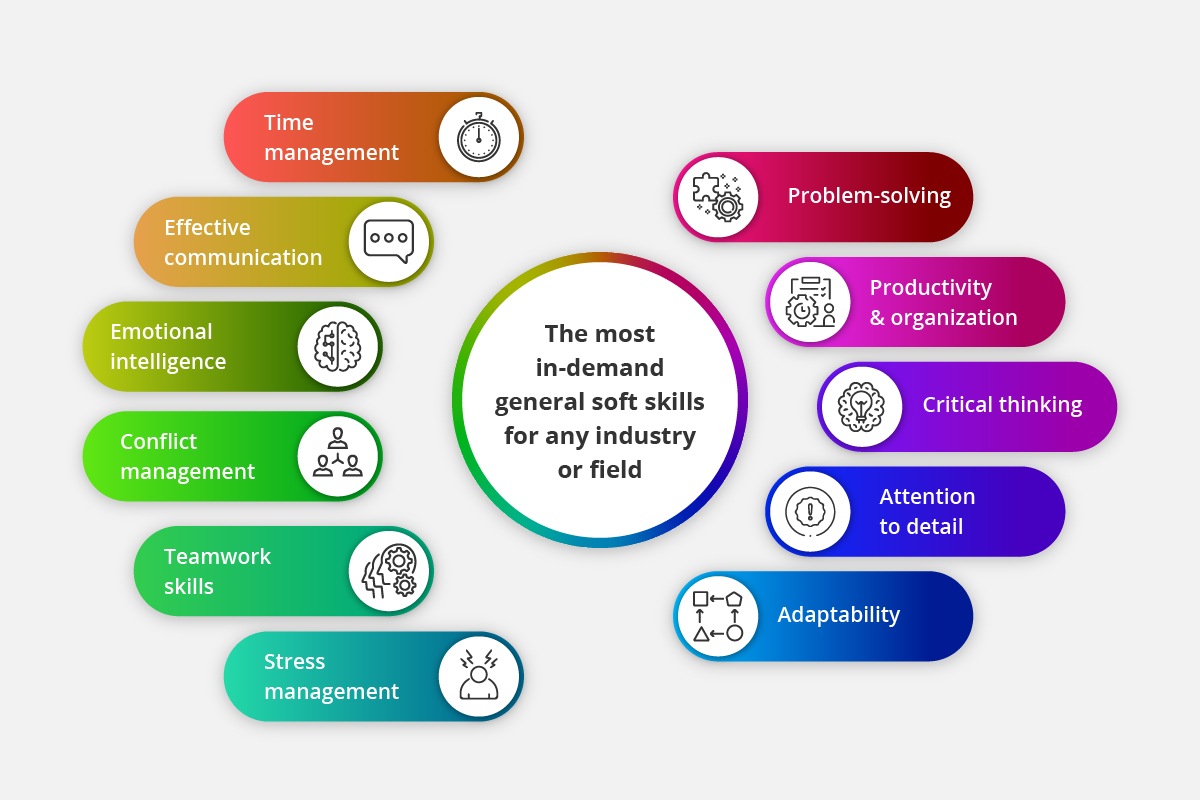
Tip: Focus on four sought-after soft skills, for example: leadership, communication, collaboration, and time management.
Why soft skills are important?
Since soft skills transfer to professional skills, they are very important to cultivate and to express to the person that is assessing your application for the role. An internal study conducted by Google in 2013, ‘Project Oxygen’, determined which skills and characteristics of employees are significant for the success of the company.
The assumption is that for the success of Google, technical skills of the employees would be first. However, these hard skills actually took the last place among the eight skills of Google’s top employees. The top seven skills that were listed as essential for Google’s success were:
- Mentoring/teamwork
- Verbal & written communication skills
- Listening/understanding others
- Connection & consideration of colleagues
- Ability to think critically & rationally
- Problem-solving & creative thinking
- General ability to communicate clearly
Further research on soft skill importance
An iCIMS Hiring Insights report found that 94% of recruiters give employees that have strong soft skills a higher chance of promotion and more leadership responsibility than specialists with years of experience but weak soft skills.
The report is based on an online survey of 400 recruitment specialists conducted by Wakefield Research from June 22 to July 3, 2017.
94% of recruiters believe that soft skills are essential for leadership and management positions. Recruiters consider problem-solving the most important skill (38%), followed by oral communication (26%), adaptability (17%), and time management (13%).
Tip: Failure to show soft skills in an interview may cost you the job. According to the report, 75% of recruiters cut the interview time short because the candidate did not demonstrate the soft skills needed for the position they were applying for.
There is an important distinction between professional skills (knowing the necessary functions to do your job) and soft skills (the way in which you do your job). Professional skills on your resume will ensure that your resume is being viewed and you’re being considered for the role. Soft skills will help you stand out, receive a job offer, or land the promotion.
Since many professional jobs require repetitive work – often when the role is more technical – jobs can begin to feel robotic. Though robots work for some roles (like efficient production line technology) there are many jobs that demand human soft skills to be present.
«When it comes to managing an entry-level employee or leading a project across many departments, a robot cannot do that», remarks Susan Vitale, a job expert and marketing director at iCIMS.
Essentially, the soft skills of flexibility, integrity, communication, and more are all needed to excel at especially high-level roles.
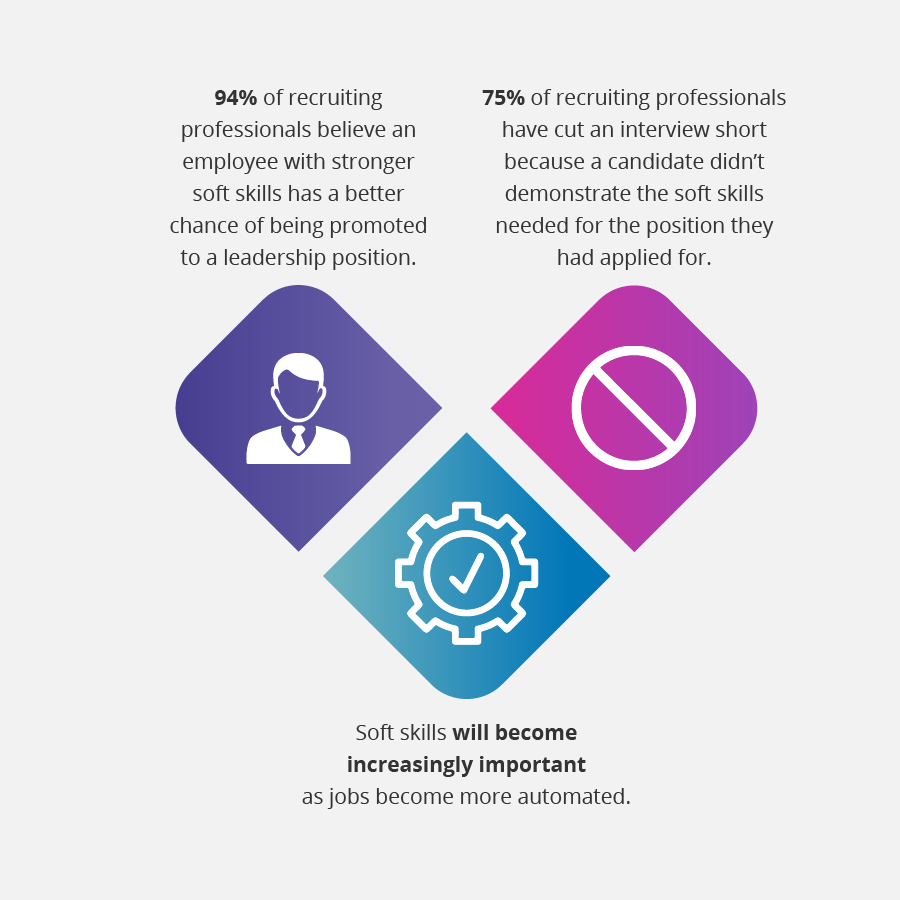
Hard skills ( professional skills)
Professional skills are the hard skills required for that particular career. They also include technical skills (as forms of professional skills), though we’ll go into those skills in more detail below. The term «hard skills» is often used when detailing specific capacities required for that job. They’re usually listed in job advertisements and job descriptions.
Some examples:
An English tutor needs the hard skill of teaching (experience &/or certification), based on the personal quality of sociability, which translates to the soft skill of communication.
The hard skill of financial analysis and reporting is necessary for a CFO, and that is based on the personal quality of focus and perfectionism, leading to the soft skill of attention to detail.
In contrast to soft skills, hard skills develop with training and experience within the context of the chosen career. Also, unlike soft skills, professional hard skills can be objectively measured and evaluated.
Tip: 91% of employers want to hire employees with ready-made professional skills. When working out how to describe your skills in resume format, share about the problems which you have solved due to the soft and hard skills you have, as well as the achievements and real-world examples to back your point up.
If you write about «time management» on your resume skills list without real examples, your resume won’t be much different from hundreds of competitors who apply for this job and have simply listed skills without any explanation or detail.
For example:
Tip: Think of professional skills like a summary of your professional experience. Think about everything that you have learned in your professional career, and narrow it down to key phrases and skill terms.
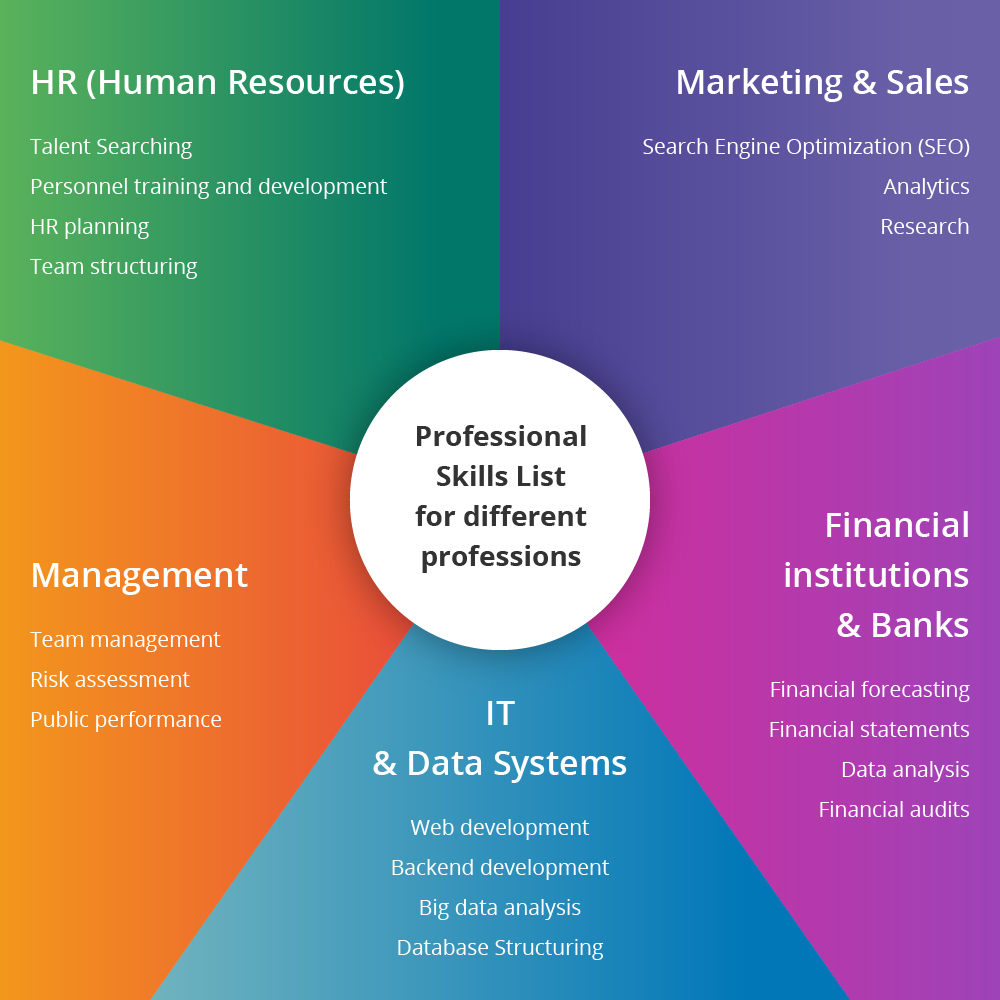
Why they are important?
There’s no doubt that expertise is essential to excel in any role to carry out specific functions. Hard skills are needed, and they will continue to be needed in the professional arena. As mentioned, personal qualities lead to soft skills, which lead to the development of hard skills. Expressing all of these types of skills on your skills to add to resume is going to ensure that you are seen as a well-rounded and valuable potential employee.
Technical skills
What are technical skills for resumes? Think of hard skills and the type of proficiencies you need in order to do those hard skills. An account, for example, needs to analyze data and manage accounts (hard skill) and for that, they need to be well versed in software like Quickbooks. So in this case, the technical skill is the ability to use Quickbooks.
As most work involves some kind of technical computer ability, when it comes to listing technical computer skills for CV creation, you have to take into account the industry and the specific role. Furthermore, look at the ‘essential skills needed’ section of the job listing to ensure that you include the right skills, as well as any additional skills for resumes that you feel are important to express for that job.
In other words, the knowledge of programs, software and specific equipment is the definition of technical skills. These skills can also be different for companies or roles within the same industry, as some accountant firms may use different software to Quickbooks, and might require someone to have a technical skill in that other program instead.
Technical Skills for Resumes List: Examples
The following professions could require the expertise of the following technical skills.
Marketer: Mailchimp
Digital Marketer: Google Ads, Google Analytics
Accountant: 1C
Project Manager: Asana, Jira
Back-end Developer: Python, Django
Dentist: DentalAccord, Planmeca
How to describe your skills? (order of appearance)
Tip: If you are looking for a job in which technical skills are extremely important (for example, in the field of IT), you should place the lists of skills in the resume above the main work experience section. This ensures that the hiring manager can quickly and easily find the most important information about your capacities.
It’s preferable to list technical and professional skills separately, rather than just having a list of «hard skills». Not all jobs will require technical skills, but if the one you’re applying for does, it will be more clear for the hiring manager to see defined lists.
Using job description keywords for your resume
Naturally, you have to adapt your resume before applying (to make it more appealing in recruiter’s or ATS eyes). Lets take a look how it should be done using a job description for a healthcare professional:
Require knowledge of software for electronic medical records and planning programs.
This company appreciates teamwork and patient satisfaction.
In this case, the best resume writing skills will include the keywords in the following list:
Alex Ocean, Medical Worker
Massachusetts General Hospital 2016 – 2018
Responsibilities:
Daily tasks in the system of electronic medical records (EMR)
Technical skills:
Software for patient records (include specific software name)
Flexible skills:
Team leadership
Interpersonal relationships
Patient care
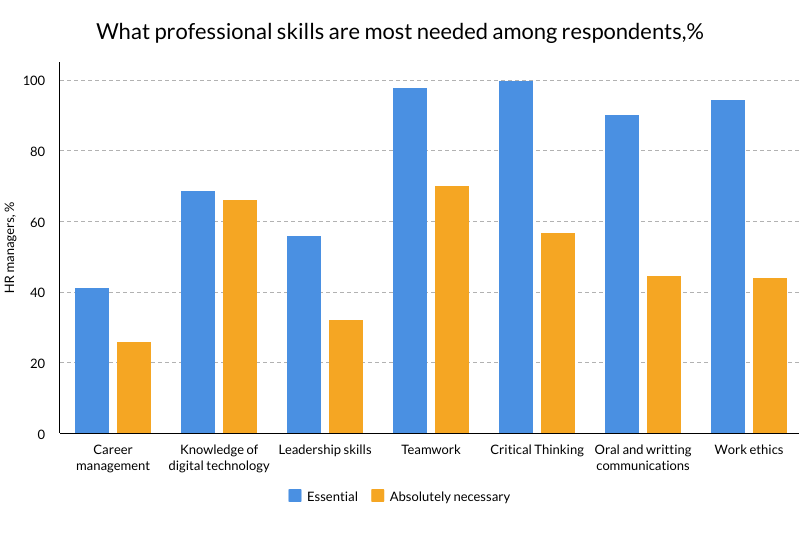
Common mistakes
Below are the top 3 mistakes that people make when listing skills on their resume.
Using buzzwords or generalized skills
Reliable, honest, hardworking — these are all empty buzzwords. When you use words that are too generic, you definitely won’t stand out as there’s probably hundred of other applicants listing the same things. Additionally, being too general about skills, like saying that you’re a «proficient Word or Internet user» really just sounds like you’re telling them that you can read and write like everyone else.
Inconsistent with skills
When listing your skills, make sure you’re not contradicting yourself. Skills have to be of the same nature, for example, if you have a soft skill listed «calm», then using another soft skill of being «energized» doesn’t sound right. The same goes with hard skills, complimenting each other in the same field.
Skills don’t match the job description
If you only read the job posting once, you’re missing out on the chance to really tailor your resume to exactly what they’re looking for, which will make you come across as the best candidate for the role. Start by reviewing the job description and marking off all the skills or abilities that match your own. In addition to job requirements, read the description of the company as you research the business and consider its mission and company culture.
Tip: Use job descriptions as keywords for your resume. Recruiters will be far more likely to call you in for an interview as they are looking out for those keywords themselves. You’ll surely stand out as an applicant worthy of interviewing.
Additional resume skills writing mistakes
- Including too much unfocused skills
- Not including examples from past roles.
- Having too many personal skills for resume lists that don’t link to the professional arena.
- Confused personal qualities and professional skills.
- Not including any technical skills for roles that would require this knowledge.
Now you have a thorough understanding of how to list skills on a resume in a comprehensive and professional way, you will enhance your chance of not only getting to the interview but also being considered as a key candidate for the role.
See also: Article about personal qualities + 12 bestsellers on the development of flexible skills
Best Practices
Keep up to date
Each section of your resume should be adapted to the requirements of a particular position. Re-read the job description carefully and decide what skills are absolutely necessary for the job. This means your resume will constantly be re-written and updated for each role you apply for.
Make a list of your strongest skills
Take a moment to think about the skills you have acquired over the years. These can be all types of qualities and skills mentioned in the article. Compare this list with the skills described in the resume posting and select the ones most relevant.
Divide your skills into subsections
Choose soft and hard skill categories to use as subheadings, including 4 to 5 skills for each category. That will make your resume super clear and organized to read.
Give evidence
If you claim to have a specific skill, back it up with concrete examples from your past roles. For example, if you have facilitated agreement on several important business deals, don’t just write «strong negotiation skills», instead, provide details like when and how to give real evidence of your skills in action.
Key takeaways
- Human qualities and skills are different things.
- Qualities are innate human traits. They include sociability, honesty, optimism, perfectionism.
- Skills build on qualities, though they are acquired and developed over time.
- There are 2 types of skills in resume writing: Soft and Hard Skills
- Soft skills include things like: Teamwork and communication skills, which are formed on the basis of your personal quality, for instance, sociability translating to teamwork.
- Hard Skills are skills that are more defined and needed for a specific profession. They branch out into professional and technical hard skills.
- A professional hard skill example is financial analysis.
- A technical hard skill example (needed for financial analysis) is the use of Quickbooks as a program.
- The most common mistake people make when completing the skills section of resumes is not including enough detail about their skills, and not making them specific to the job they are applying for.


